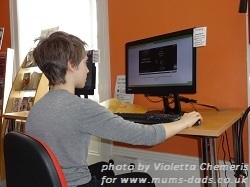Whizzy Whizzy Bang Bang
 As soon as he bursts through the front door after the school day, Curtis leaps up the stairs with the fervour of an Olympic hurdle competitor, so keen is he to get back onto the computer from which he has been so cruelly wrenched a mere six hours ago. Within minutes, he is logged on, fingers flickering expertly across the keyboard and brow furrowed with intense concentration. With barely suppressed glee, he gives a running commentary on the state of his avatar, the goods he has amassed, the points earned and the triumphs celebrated. It takes persuasive efforts not normally seen outside intense hostage negotiation situations, for his mum to convince him to abandon his games for the far less exciting delights of supper. As for bed…..Mum has to wrestle the laptop from his sticky grasp in order to coax him to get some much needed shut-eye so that he is ready for another days gaming tomorrow.
As soon as he bursts through the front door after the school day, Curtis leaps up the stairs with the fervour of an Olympic hurdle competitor, so keen is he to get back onto the computer from which he has been so cruelly wrenched a mere six hours ago. Within minutes, he is logged on, fingers flickering expertly across the keyboard and brow furrowed with intense concentration. With barely suppressed glee, he gives a running commentary on the state of his avatar, the goods he has amassed, the points earned and the triumphs celebrated. It takes persuasive efforts not normally seen outside intense hostage negotiation situations, for his mum to convince him to abandon his games for the far less exciting delights of supper. As for bed…..Mum has to wrestle the laptop from his sticky grasp in order to coax him to get some much needed shut-eye so that he is ready for another days gaming tomorrow.
You would be forgiven for assuming that Curtis is yet another child addicted to computer games. Perhaps you are even wondering what kind of parents Cutis has, who have allowed him such unfettered online access.
But you would be wrong. Curtis is not playing computer games as such. He is not addicted to Candy Crush or FarmVille. No, this is his maths homework.
Homework is not what it used to be. The days of workbooks and sheets of paper are almost distant memories as computerised homework applications take over in more and more schools across the UK. Modern homework is less about getting books out and sharpening pencils as firing up the computer and getting to grips with Google. Homework is now all about apps, user names, creating avatars and competing with peers across the globe.
As a psychologist who happens to research boredom, I am rather unimpressed with the new direction that homework is taking. In fact, I argue passionately in my new book on boredom (The Upside of Downtime: why boredom is good, out in March) that too much screentime is bad for us. Our children are being reared on a screen-full diet that is increasingly rich in stimulation and as a consequence, are becoming more and more dependent on fast-moving, ever-changing, novel and noisy environments. This, I argue, leaves them seeking ever-more stimulation because the more stimulation we get, the more we need. This is due to dopamine, the feel-good chemical, which is released when we encounter something new and exciting. And dopamine is highly addictive – we crave it, but once a stimulus is no longer novel, we need something even newer and more exciting to give us that same hit.
School is becoming a place not just of learning, but of over-stimulation, as teachers compete to introduce ever-more ‘engaging’ methods into their material. Learning at school is largely computer based now with interactive whiteboards and iPads. Kids also have iPads at home, laptops and many have smartphones. If homework becomes largely screen based too, kids will soon be living the bulk of their waking moments via a screen, with its fast-paced, loud, ever-changing images. There are even apps for reading which bring books to ‘life’; with the mere swipe or scroll by chubby fingers, sounds, moving images, voices and a never-ending array of thrills magically appear – no imagination required. Learning and homework apps are exciting – never a dull moment. But that is the problem. Given the choice, of course our kids would prefer reading apps instead of the quieter, calmer environments that real books offer. Of course they prefer thrilling computer programmes that transform the tedium of maths homework into a thrilling fast-paced electronic game.
But is it good for them? I argue not. Children accustomed to what I refer to in my book as the ‘whizzy whizzy bang bang’ electronic world we are living in, will have reduced tolerance for a slower pace of life. They will have reduced attention spans and restricted ability to concentrate for any length of time. They will get bored far too quickly and will lack the patience required to lose themselves in a (real) book, to read a document, to study for exams or to simply sit in quiet contemplation.
We are growing a nation of children who expect to be entertained to such an extent that they are unable to cope with lower levels of stimulation. Combined with all the instant and engaging (but soundbite-short) technology around them, our kids are growing up with ever-decreasing attention spans and thresholds for boredom. They are getting bored more easily and lack the skills to cure their ennui themselves.
This is why I resist electronic homework, reading apps and maths apps. Let homework be homework and keep the computer games, apps and screen-time out of our kids’ schoolbags.







